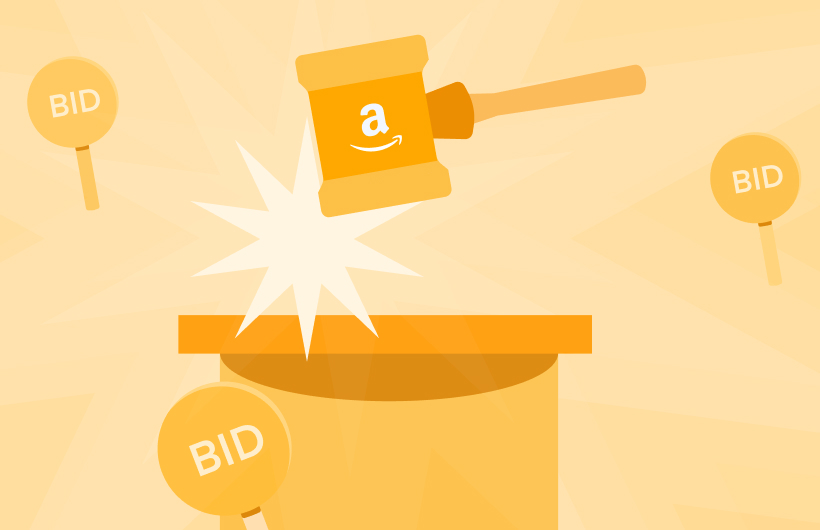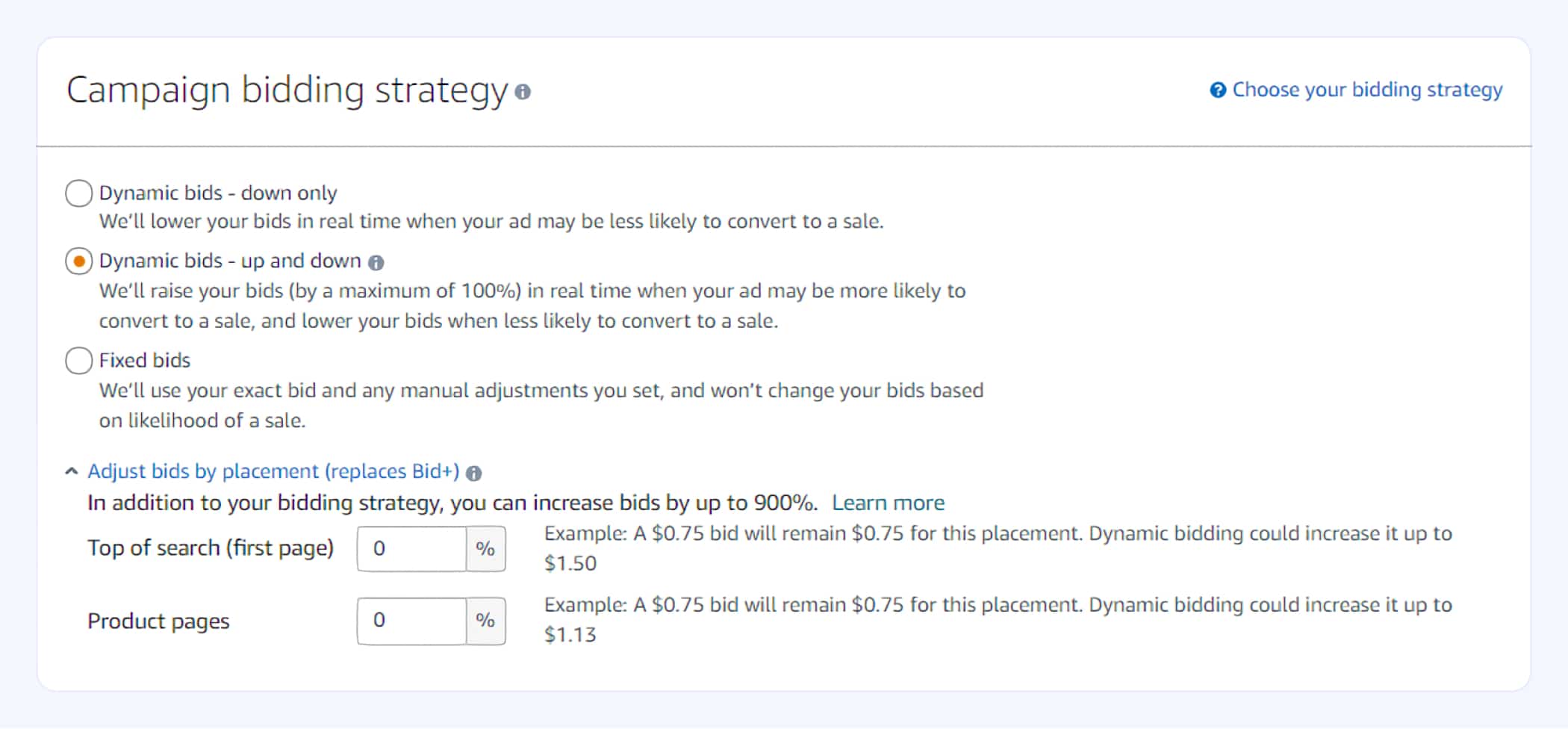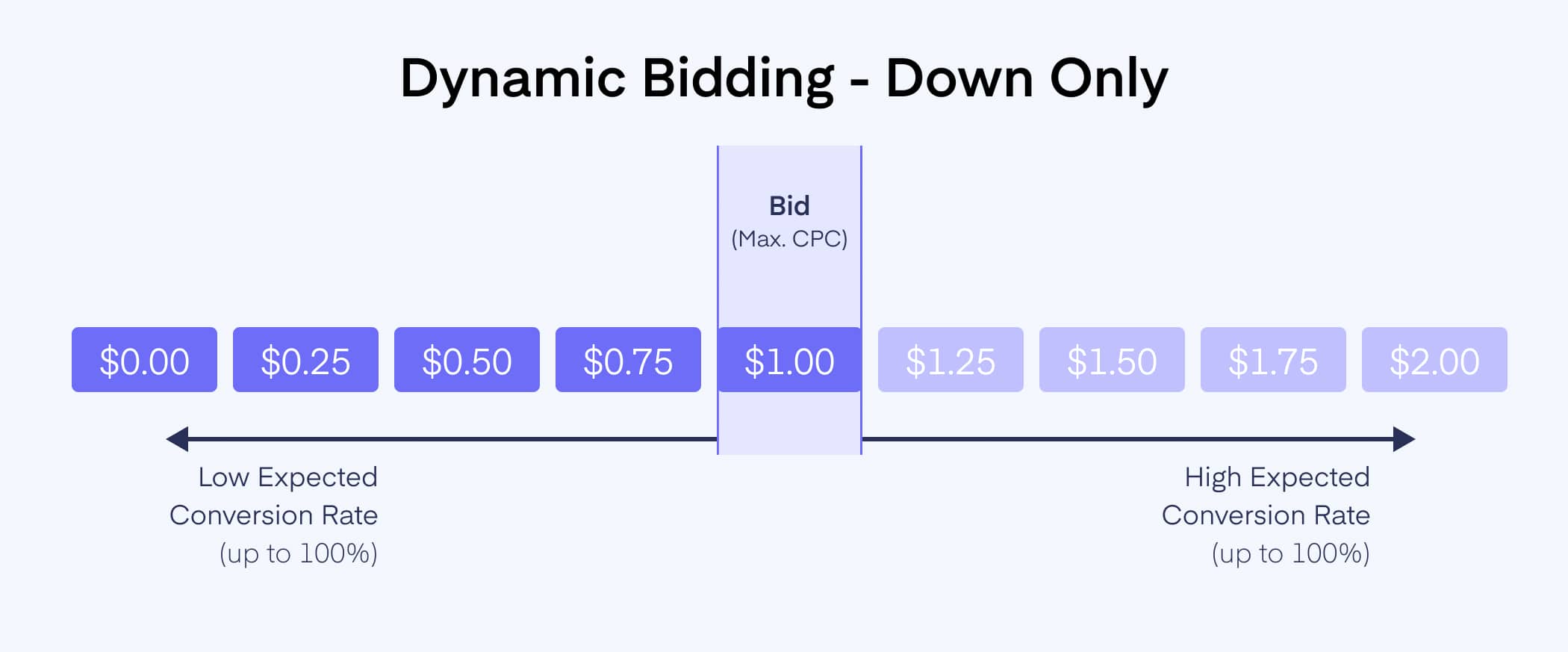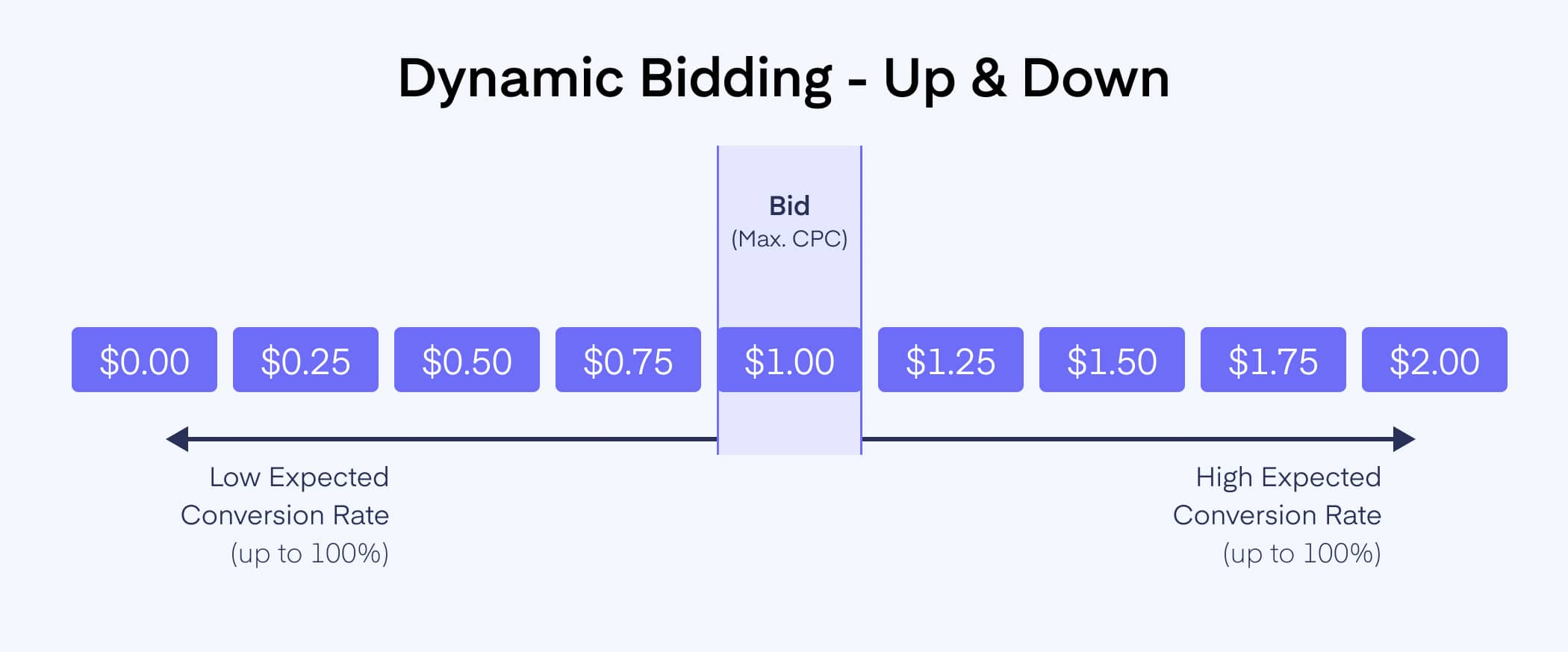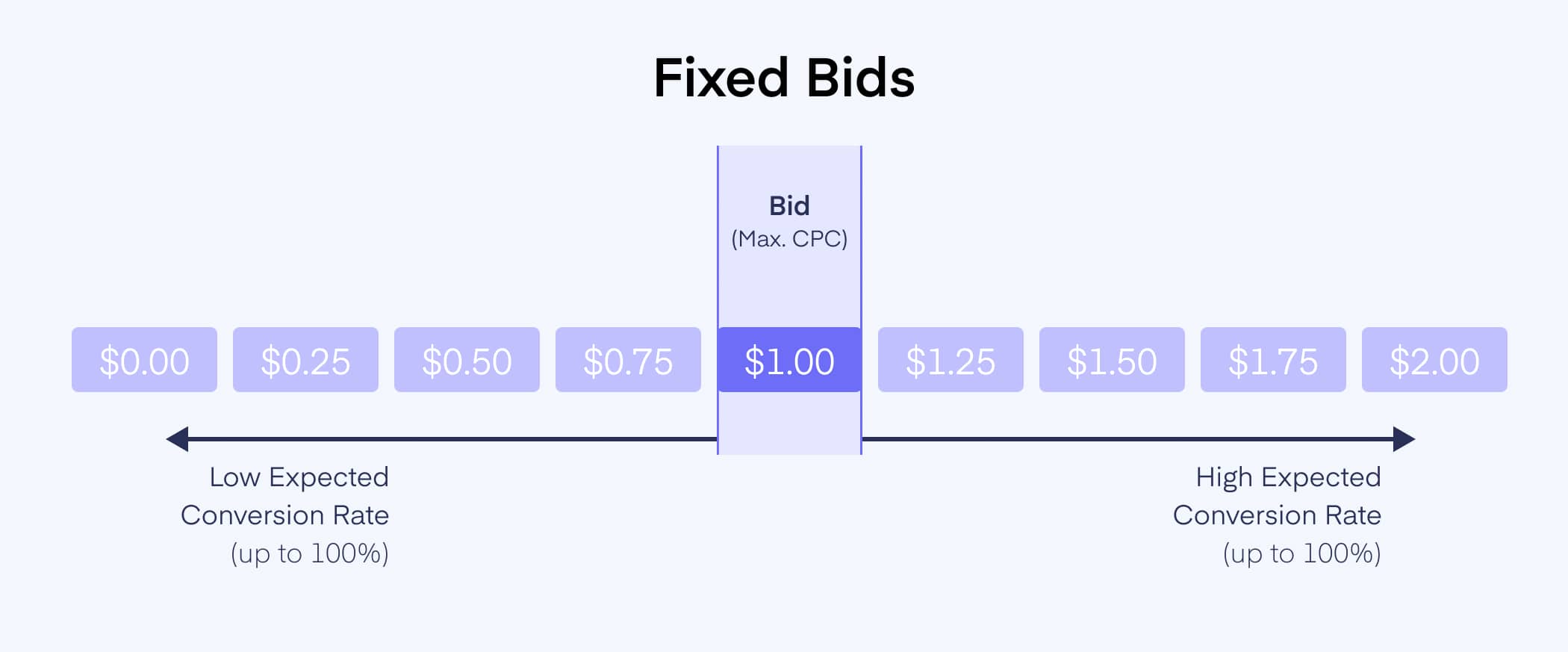Amazon is a place of action, and the main action there is bidding. There to increase, here to adjust, somewhere else to decrease… So much work, where to begin? Get started by learning as much as possible about Amazon bidding in this article.
What is Amazon Bidding?
Amazon bidding is an auction-based system that allows sellers to place bids for keywords or products with the aim of showing their ads to potential buyers.
Talking about Sponsored Products, there are three types of Amazon bidding process to place bids on the SP ad placements, as illustrated below in the screenshot:
Let’s break down each bidding strategy to understand the bidding options better.
Amazon Bidding Strategies
Amazon Dynamic Bids — Down Only
One of the bidding options sellers have is dynamic bidding — down only. Sellers that choose this feature allow Amazon to lower the bids up to 100% in case the click is unlikely to convert. This action will be based on historical data.
The likelihood of the click is analyzed and calculated by Al. The considered information consists of many aspects like customer behavior, niche data, etc., and takes a lot of time to be processed for an accurate decision.
Amazon Dynamic Bids — Up and Down
The second bidding option is dynamic bidding — up and down. Amazon increases or decreases the bid depending on the likelihood of the conversion. Amazon raises or lowers the bid up to 100%.
Fixed Bids
The third option isn’t dynamic bidding, it’s unchangeable. Amazon bid can be chosen by the advertiser.
How does Amazon Bidding Work?
The system of looking for products on Amazon is just that: sellers type in search terms in the search bar and scroll through the search result pages to find the perfect one for them. So, when advertisers want to display their ads to the shoppers that are interested in what they are selling, they need to include the right keywords in their campaigns.
However, that’s not all it takes to reach the right audience with PPC ads. It also includes the Amazon bidding process. Just like with Google Ads, on Amazon, advertisers participate in enhanced Second-Price Auction.
In the Second-Price Auction model wins the advertiser with the highest bid. Nevertheless, the winner’s final price for the click on their ads is only 0.01$ more than the second-highest bid in that auction.
In order to make the right decision about the Amazon campaign bidding strategy, sellers need to understand what is the right bid for them. The equation to calculate the optimal bid is:
Bid = Max. CPC = Avg. Order Value x Conversion Rate x ACOS Target
Even so, this calculation is just a base for such a vital decision. When it’s clear which bid is convenient for the campaign, advertisers will feel more ensured about their strategy choice.
What is ‘Adjust Bid by Placement’?
Besides Amazon bidding strategies the platform provided in 2020, there was also launched another functional option — ‘Adjust Bids by Placement‘. This tool is an opportunity to show ads in certain places through bidding more for those placements. The placement are divided into the following categories:
- Top-of-Search
- Rest-of-Search
- Product Pages
Advertiser’s Amazon bid can be increased up to 900% for placements ‘Top of Search’ and ‘Product Pages.’
The use of the tool can help sellers’ bids become more competitive. Based on the Placement Report, advertisers will be able to determine where exactly their ad performance is the most successful and, actually, which placement is worth “fighting” for it, or, literally, their investments.
Why Is ‘Adjust Bids by Placement’ Important?
‘Adjust Bids by Placement,’ and Amazon bidding strategies work together. While adjusting bids by placements and selecting a specific method, sellers also need to monitor bids’ modifications to avoid overspending where it’s unnecessary.
Winning the perfect placement for the ad is essential because after investigating the report and finding out that, for example, customers in 90% of cases click on the ad in Top-of-Search and only in 10% of cases they get to the other placements, the seller will now for sure what bids to increase.
Bids by placement change bids by a specific amount, so the advertiser knows where the limit of the affordable expenditure is.
How to Use Bid by Placement on Amazon?
Since placement adjustment is mostly based on historical data from the personal Placement Report, the predictions about click-through rates (CTR) and conversion rates (CRV) are very likely to come true.
Top-of-Search usually has the highest chances of improved CTR and CRV. In spite of all the afford Amazon puts into making sellers’ life easier and launching new tools so often, advertisers still need to control the bids. Ad Console provides very concrete data about advertising performance in each placement. The time that can be spent trying to understand how to improve results is extremely reduced nowadays (see the screenshot below). The constant changes of bids are inevitable.
Amazon Dynamic Bidding
The first thoughts advertisers might have while creating first campaigns is that fixed bidding can help them avoid all the troubles, budget, and time waste. But Amazon bidding isn’t as simple. Advertisers might change the Amazon bidding strategies a couple of times over a short period because there is no precise instruction on which bidding strategy to choose. Picking dynamic bidding brings certain aspects sellers need to think of:
-
Costs
No advertiser wants to pay too much for the ad click because, in the end, profit is what everyone aims for. Dynamic bidding was invented to help sellers understand where to spend less but also to surpass competitors in the places where they can increase their income significantly.
-
Sales
Because advertising is a tool that improves not only the ad sales but also organic sales and ranking, advertisers might find the question of dynamic bids modification crucial. Dynamic bids support sellers in their wish not to lose placements and keywords that will refine their results.
Profit Whales Advices
We frequently use the bidding strategy Down Only to regulate the upper limit of the CPC manually. It allows precise control of the dependency between the positions, click cost, and conversion rate.
In the case of a keyword that brings the biggest part of the traffic, we often switch to Fixed Bids. It was proven by the inside statistic that with this strategy sellers get more impressions because if the seller loses the position, the ads don’t go far down but take second place.
Amazon dynamic bids up to and down aren’t used in our structure. However, it can be utilized for a test with a new product when sellers don’t know their CPC. This way sellers get more traffic.
Conclusion
Surely, the Amazon bidding process seems confusing and sometimes even overwhelming for many sellers, but there is no reason to worry. Amazon keeps rolling out new features to give sellers the necessary tools to operate on the platform successfully.
Monitor the metrics, keep an eye on the keywords, optimize them when necessary, and the desired results will come!

